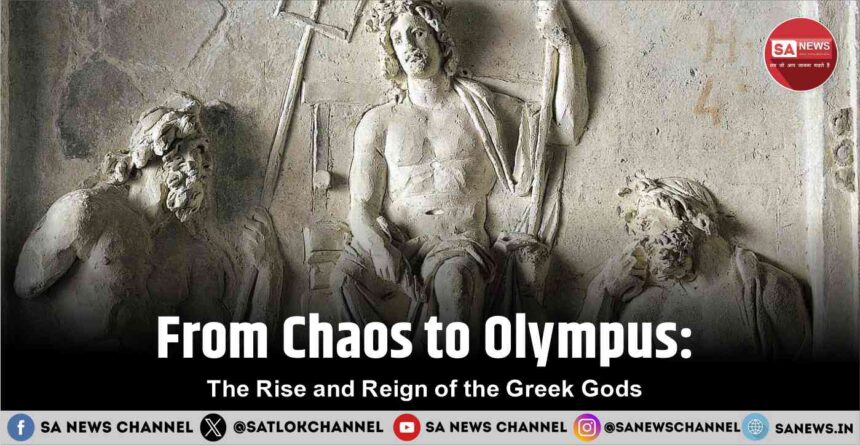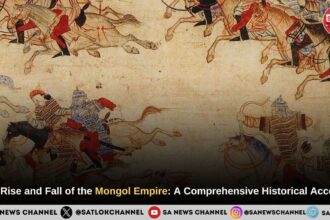Greek mythology is not merely a collection of old stories but a deep reservoir of ancient beliefs, cosmic drama, and spiritual symbolism. The Greek gods represent forces of nature, aspects of human personality, and the complexities of morality and power. The history of the Greek gods stretches from primordial beginnings to a structured Olympian hierarchy, influencing literature, art, psychology, and modern culture.
The Primordial Beginnings
According to Greek mythology at the dawn of existence, there was Chaos, a void, not disorder, but the nothingness from which everything emerged. Out of Chaos came Gaia (Earth), Tartarus (the abyss), Eros (love), Nyx (night), and Erebus (darkness). These primordial deities weren’t anthropomorphic but rather cosmic forces that brought structure to the universe.
Gaia gave birth to Uranus (Sky), and together they produced the Titans, including Cronus and Rhea. But Uranus, fearing his children, imprisoned them. In a dramatic act of rebellion, Cronus overthrew Uranus, ushering in a new era.
The Age of the Titans
Cronus became ruler but repeated his father’s mistake. Fearing a prophecy that one of his children would dethrone him, he swallowed each newborn. Rhea, determined to save her youngest, Zeus, tricked Cronus by hiding the baby and giving him a stone wrapped in cloth instead.
Zeus grew up in secret, eventually returning to challenge his father. With the help of his siblings; Poseidon, Hades, Hera, Demeter, and Hestia, he waged a war known as the Titanomachy. The Olympians emerged victorious, and the Titans were cast into Tartarus.
The Olympian Era
Zeus established his rule on Mount Olympus, becoming the king of the gods. His brothers Poseidon and Hades took dominion over the sea and the underworld respectively. The Olympian gods formed a divine council of twelve, including:
- Zeus: God of the sky and thunder
- Hera: Goddess of marriage and family
- Poseidon: God of the sea
- Demeter: Goddess of agriculture
- Athena: Goddess of wisdom and war
- Apollo: God of music, prophecy, and healing
- Artemis: Goddess of the hunt and moon
- Ares: God of war
- Aphrodite: Goddess of love and beauty
- Hephaestus: God of fire and craftsmanship
- Hermes: Messenger god, patron of trade and thieves
- Hestia or Dionysus: Goddess of the hearth or god of wine, depending on the tradition
These gods were deeply anthropomorphic, full of flaws, emotions, and desires. Their stories depicted love affairs, jealousies, vengeance, and heroism, making them relatable yet awe-inspiring.
Interaction with Humans
Unlike distant deities in some religions, Greek gods were deeply involved in human affairs. They interfered in wars, fell in love with mortals, and sometimes punished or rewarded human behavior.
For instance, Zeus had many affairs resulting in demigods like Hercules and Perseus. Athena assisted Odysseus in Homer’s Odyssey, while Apollo guided and cursed humans through his oracles. The gods’ interactions were often moral lessons about hubris, loyalty, and fate.
Myth and Meaning
Each myth carried symbolic meanings. Prometheus, who stole fire from the gods to give to humanity, represented enlightenment and defiance. Pandora’s box warned against unchecked curiosity. The myth of Persephone explained the changing seasons.
These myths also provided explanations for natural phenomena and human psychology. They shaped rituals, festivals, and religious practices throughout the Greek world.
Influence Beyond Greece
Greek gods and their stories traveled far beyond their homeland. They were adopted and adapted by the Romans, who renamed them (Zeus became Jupiter, Hera became Juno). Their tales have echoed through Renaissance art, Enlightenment philosophy, and modern pop culture.
Carl Jung and Sigmund Freud used Greek myths to explain archetypes and the unconscious mind. Writers like Homer, Hesiod, and Euripides preserved these myths, and today, they continue to inspire novels, movies, and video games.
Decline of Worship
The decline of worship of the Greek gods was not sudden but gradual, unfolding over centuries as political, religious, and cultural transformations swept through the Mediterranean world. With the expansion of the Roman Empire and the rise of monotheistic religions, especially Christianity, the polytheistic traditions of Greece began to fade.
By the 4th century CE, Christian emperors like Constantine and Theodosius I issued edicts that outlawed pagan practices, closed temples, and redirected religious authority to the Church. The famous Oracle of Delphi fell silent, and grand temples such as the Parthenon were converted into Christian churches.
Also Read: Ancient India: A Complete History from Prehistoric Times to Early Empires
Despite the suppression, many old beliefs lingered in folklore, rural traditions, and even in early Christian imagery. Yet over time, the Greek gods were increasingly seen not as real deities but as fascinating mythological characters, their divine authority replaced by theological doctrine.
Still, the memory of these gods endured not through worship, but through literature, art, language, and philosophy. They found a new form of immortality in the cultural consciousness of Western civilization.
Eternal Echoes of Olympus
The history of the Greek gods is not just about divine beings in the sky but reflections of human nature, cosmic order, and moral complexity. They represent love, war, wisdom, revenge, and creation, themes that remain eternally relevant. Though their worship has faded, their influence endures. The gods of Mount Olympus still reign in the imagination of humanity, reminding us of our own myths, struggles, and the timeless dance between fate and free will.
Spiritual Perspective: Was Worshiping the Greek Gods the Right Spiritual Practice?
In ancient Greece, worshiping the gods was deeply integrated into daily life and cultural identity. These deities symbolized nature’s forces and human emotions, and rituals honoring them aimed to maintain cosmic and societal balance. However, from a broader spiritual perspective, especially one rooted in the search for one eternal, omnipotent God, the Greek gods were limited, anthropomorphic beings. Philosophers like Plato began to view them symbolically, and later religious traditions considered such worship as misdirected.
Thus, while worshiping Greek gods was culturally “right” for their era, providing structure, meaning, and communal identity, it may not align with the ultimate spiritual truth as revealed in authentic scriptures. These scriptures, found in texts like the Vedas, the Quran, the Bible, and especially the holy Suksham Ved (as emphasized by Chyren Sant Rampal Ji Maharaj), speak of one, eternal, all-powerful Supreme God who is the Creator of all universes and beyond the limitations of time, birth, and death. Unlike the Greek gods, who were born, fought among themselves, and exhibited human weaknesses, the Supreme God is flawless, compassionate, and the only one who can grant true salvation.
Therefore, while Greek mythology offers rich symbolic and cultural insight, it lacks the spiritual depth and scriptural foundation necessary for attaining liberation (moksha) and reaching the eternal abode (Satlok), which only true devotion to the Supreme God can provide.
In the Vedic tradition, it is explicitly stated that God, the Supreme Being, does not take birth, does not die, and is not subject to any limitations of time, space. The Vedas describe the Supreme Being, often referred to as Parabrahm or Supreme God, as beyond the cycle of birth and death.
Vedic Evidence on God’s Nature:
Bhagavad Gita (Chapter 2, Verse 12): In the Bhagavad Gita, Lord Krishna who is a divine incarnation, but not the Supreme God himself, makes it clear that the true, in human form Supreme God is eternal:
“There was never a time when I did not exist, nor you, nor all these kings. Nor will there be a time “when we cease to be.”
This verse establishes the eternal nature of the Supreme Being. According to the Vedas, God is in form and beyond the constraints of time, which means God does not experience birth or death.
Yajurveda (Chapter 32, Verse 3): The Yajurveda states:
“There is no birth and no death for the Supreme Being. He is not born, nor does He die.”
This explicitly contradicts the concept of a divine being who takes birth and dies, which is a characteristic of lesser gods in various mythologies, including the Greek pantheon.
Vishnu Purana (Book 1, Chapter 22): The Vishnu Purana describes the nature of God in relation to creation but highlights that God Himself is unaffected by it:
“God is beyond birth and death. He is eternal, self-existent, and unchanging. While He creates the universe, He Himself does not undergo the cycle of birth, growth, or decay.”
The Vedas and Upanishads categorically state that the Supreme God is beyond birth and death. The concept of God taking birth is a misinterpretation or distortion that arises in some traditions where divine beings assume temporary forms to fulfill specific purposes (such as in the case of incarnations like Lord Vishnu’s avatars). However, the true Supreme God, as described in the scriptures, remains in human-like form, eternal, and unaffected by the limitations of physical existence.
This understanding aligns with the teachings of Sant Rampal Ji Maharaj, who emphasizes that the Supreme God does not take birth in the worldly sense but is the Creator of all creation. To know the creation of nature and about the Kaal Brahm’s dummy Gods please read the book Gyan Ganga, download the free pdf from Sant Rampal Ji Maharaj app from play Store/ app store.
FAQs About the History of Greek Gods
1. What is the meaning of Anthropomorphic?
Anthropomorphic means giving human characteristics, emotions, or forms to non-human beings or things. In the context of gods, anthropomorphic gods are imagined to look and act like humans, having bodies, feelings like anger or love, and engaging in human-like behavior. For example, Greek gods like Zeus or Hera are anthropomorphic because they resemble humans in appearance and emotions.
2. Who were the first Greek gods according to mythology?
The earliest deities were primordial beings like Chaos, Gaia (Earth), Uranus (Sky), Tartarus (Abyss), and Nyx (Night). They represent foundational elements of the universe rather than human-like gods.
3. What caused the transition from Titans to Olympians?
Cronus, a Titan, was overthrown by his son Zeus in a divine war known as the Titanomachy. Zeus and his siblings, the Olympians, then established a new order based on Mount Olympus.
4. Did ancient Greeks worship all twelve Olympian gods equally?
No. Worship varied by region and personal devotion. For example, Athena was highly revered in Athens, while Apollo had a major cult center at Delphi.
5. Why did worship of the Greek gods decline?
With the rise of Christianity in the Roman Empire, pagan religions were gradually outlawed. By the 4th–6th centuries CE, Greek temples were shut down or repurposed.
6. Are Greek gods still worshipped today?
While not widely practiced, some modern groups, known as Hellenists or practitioners of Hellenic polytheism, do honor the ancient Greek gods in revivalist traditions.









